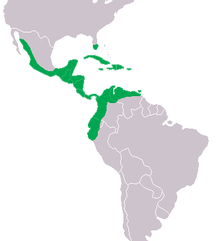Crocodylus acutus
| American crocodile | |
|---|---|
 |
|
| Scientific classification | |
| Kingdom: | Animalia |
| Phylum: | Chordata |
| Class: | Reptilia |
| Order: | Crocodilia |
| Family: | Crocodylidae |
| Genus: | Crocodylus |
| Species: | C. acutus |
| Binomial name | |
|
Crocodylus acutus Cuvier, 1807 |
|
 |
|
| Approximate terrestrial range (green) | |
| Synonyms | |
|
|
The American crocodile (Crocodylus acutus) is a species of crocodilian found in the Neotropics. It is the most widespread of the four extant species of crocodiles from the Americas. Populations occur from the Atlantic and Pacific coasts of southern Mexico to South America as far as Peru and Venezuela. It also lives on many of the Caribbean islands such as Cuba, Jamaica, Hispaniola and Grand Cayman.
Within the United States, the American crocodile's distribution is limited to Puerto Rico and the southern half of Florida, though at least two have been found as far north as the Tampa Bay area. The current US population, estimated at 2,000, represents a significant recovery from a few hundred in the 1970s.
The habitat of the American crocodile consists largely of coastal areas. It is also found in river systems, but has a tendency to prefer, not merely to tolerate, some level of salinity, resulting in the species congregating in brackish lakes, mangrove swamps, lagoons, cays, and small islands. Other crocodiles also have tolerance to salt water due to salt glands underneath the tongue, but the American crocodile is the only species other than the saltwater crocodile (C. porosus) to commonly live and thrive in salt water. They can be found on beaches and small island formations without any freshwater source, such as some of the many cays and islets across the Bahamas and the Caribbean. They are also found in hypersaline lakes; one of the largest known populations inhabits the Lago Enriquillo.
...
Wikipedia

